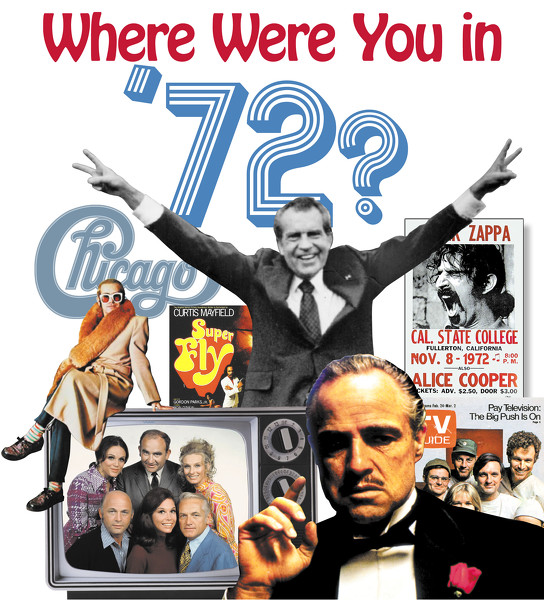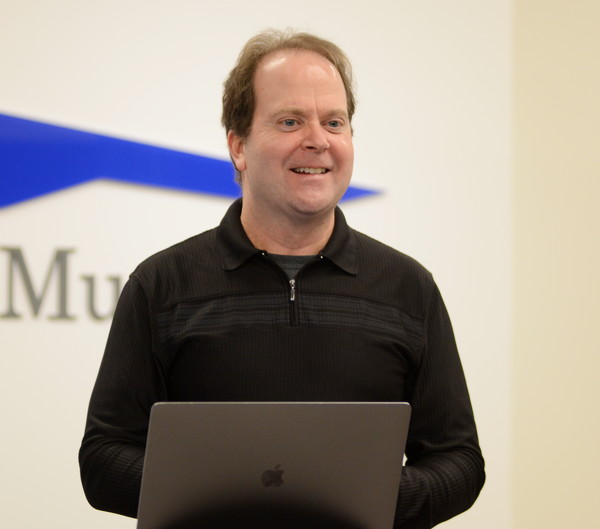Saturday, April 9th, 2022
Where were you in 72?
Pop culture exploded 50 years ago
By Leslie Gartrell

Richard Nixon, Frank Zappa, Super Fly soundtrack, Elton John, The Mary Tyler Moore Show cast, The Godfather, MASH cast, Archie Bunker.
SOURCES: Associated Press, CBS, Paramount Pictures, TV Guide, Rolling Stone
WAPAKONETA - Pop culture in 1972 saw Richard Nixon's landslide, "The Godfather," the rise of major music festivals and "Pong," the first real video game.
Matthew Donahue, a Bowling Green State University professor in the popular culture department, spoke about pop culture in 1972 at the Armstrong Air and Space Museum in honor of the museum's 50th anniversary. His talk largely centered on the music of 1972.
"Popular culture is anything and everything in our daily lives, such as music, film ... books, advertising, clothing ... food, internet culture, comic books and holidays," he said. "Studying popular culture as the new humanities allows for a deeper understanding of our humanity and should be celebrated."
United States is a leader in pop culture, Donahue said. Pop culture helps people understand what was happening at a certain point in time. For example, pop culture in the 1960s was heavily influenced by political turmoil with the Vietnam war and the rise of Cold War politics, Donahue said.
The 1960s is also known as the "we generation" considering the political protests and the civil rights movement. In contrast, those raised in the 1970s are often referred to as the "me generation," which is often billed as narcissistic and self-indulgent, he said.
"Characteristics of popular music of 1970s was very diverse and very much changing rapidly," he said. "Really, really dynamic, and so many different genres (came) out of this."
The rock of the 1970s is often referred to as "corporate rock," as major record labels took an interest the type of music that previously only independent labels like Chess Records had promoted in the 1950s. The 1970s also gave rise to arena rock, where musicians transitioned from performing in clubs and smaller venues to sold-out arenas and music festivals.
Music festivals such as Woodstock, Monterey Pop Festival, The Isle of Wright and Miami Pop Festival helped set the stage for the continuation of rock and roll festivals, Donahue said. One of the most notorious festivals of the 1970s was the chaotic Altamont Rock Festival near San Francisco in 1972, where The Rolling Stones hired the Hell's Angels motorcycle gang to act as security which resulted in the death of a concert goer.
Rock dominated the music scene in the 1970s, Donahue said. Musicians fused rock with jazz, pop, rhythm and blues, country and classical music to create a diverse music scene, he said, similar to musicians today who blend genres.
One musical crossover trailblazer is Miles Davis, Donahue said, whose 1970 jazz fusion album "Bitches Brew" broke new ground. Davis saw youth were turning away from the old-school jazz and wanted something that could go toe-to-toe with rock music, he said.
Davis surrounded himself with other musical luminaries such as John Coltrane, Herbie Hancock and Chick Corea who later went on to have successful solo careers in the 1970s.
Artists such as Eric Clapton, ZZ Top and George Thorogood found success in mixing rock with blues and have maintain their popularity today.
The intersection of rock and soul/rhythm and blues gave rise to the funk movement, Donahue said, which the blaxploitation films of the 1970s brought to the forefront. The soundtracks to many blaxploitation films were made by funk artists of the time, Donahue said. The soundtrack for the 1972 film "Super Fly" was made by Curtis Mayfield, featuring the theme song "Freddie's Dead" and the anti-drug anthem "Pusherman."
Rock and classical music combined to create progressive rock, also known as prog rock, Donahue said. Prog rock songs could span well over six or 10 minutes, which made for an orchestral listening experience.
The musical stylings of Pink Floyd, Yes, Jethro Tull and Emerson, Lake & Palmer featured complex instrumental and compositional techniques. Jethro Tull's "Thick as a Brick" was one of the best-selling albums in 1972, Donahue said.
Groups such as Lynyrd Skynyrd, The Allman Brothers Band and The Marshall Tucker Band wereknown for the rock and country crossover of southern rock.
The Eagles' first self-titled album and Deep Purple's classic "Smoke on the Water" made both their debuts in 1972, Donahue said.
Artists such as David Bowie and Alice Cooper brought their own flair and theatrics to rock,Donahue said, with Bowie releasing "Space Odyssey's" follow-up "Starman" and Cooper's "School's Out" in 1972, Donahue said.
In addition, 1972 was a breakout year for rock and feminism, Donahue said. Aretha Franklin released "Young, Gifted and Black" in 1972, and Roberta Flack had success with her album "First Take." Carly Simon's earworm "You're So Vain" was also a popular tune that year, he said.
Donahue also spoke about viewing pop culture through the lens of myths, icons, rituals, stereotypes and heroes.
People who grew up in the 1970s can relate to the ritual of going to the record store and thumbing through albums, the iconic sound and imagery of the electric guitar and the myth that music is bad for the youth, Donahue said.
At the end of the program, audience members reminisced on double-sided albums, quality disc jockeys and trying to make mixtapes by catching songs on the radio.

Mattthew Donahue, a professor in the pop culture department at Bowling Green State University, spoke at the 50th anniversary of the Armstrong Air and Space Museum in Wapakoneta.



